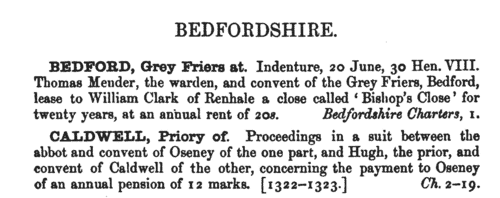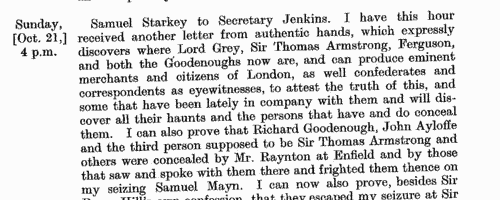Lyngwood Surname Ancestry ResultsOur indexes 1000-1999 include entries for the spelling 'lyngwood'. In the period you have requested, we have the following 5 records (displaying 1 to 5): Buy all | | | Get all 5 records to view, to save and print for £20.00 |
These sample scans are from the original record. You will get scans of the full pages or articles where the surname you searched for has been found. Your web browser may prevent the sample windows from opening; in this case please change your browser settings to allow pop-up windows from this site. Inhabitants of Suffolk
(1524)
The lay subsidy granted by Act of Parliament in 1523 was a tax on the laymen (as opposed to clergy), levied on householders, landowners, those possessing moveable goods worth £1 or more, and all workmen aged 16 or over earning £1 or more per annum. Real estate was taxed at a shilling in the pound; moveable goods worth £1 to £2 at fourpence a pound; £2 to £20 at sixpence a pound; and over £20 at a shilling in the pound. Wages were taxed at fourpence in the pound. Aliens were charged double; aliens not chargeable in the above categories had to pay a poll tax of eightpence. The records of the assessment for the county of Suffolk, mostly made in 1524, survive in 64 rolls in the National Archives. From 42 of these a compilation for the whole shire was printed in 1910 as Suffolk Green Book x. This includes a list of defaulters of 1526 and a subsidy roll of 1534 for Bury St Edmunds.LYNGWOOD. Cost: £4.00.  | Sample scan, click to enlarge

| Suffolk Charters
(1560-1569)
A large accumulation of documents preserved in the Bodleian Library, Oxford, formerly constituted the antiquarian collections of Anthony a Wood, Roger Dodsworth, Ralph Thoresby, Thomas Martin of Palgrave, Thomas Tanner bishop of St Asaph, Dr Richard Rawlinson, Richard Furney archdeacon of Surrey, and Richard Gough. A calendar of these was prepared by William H. Turner and published in 1878 under the title 'Calendar of Charters and Rolls preserved in the Bodleian Library'. The word 'charters' is here used in a rather loose sense, including virtually any manuscript or copy of a manuscript, but the bulk of the contents consists of mediaeval deeds of conveyance. Turner's calendar deals with each briefly, naming the principal parties and the nature of the deed, but hardly ever lists the witnesses. Many of these charters were undated (dating of deeds did not become general until around 1350) or so damaged or defective ('mutilated' is Turner's usual description) as no longer to display a legible date. However, he contrived, from the style of the script and/or the nature of the contents, to estimate dates in such cases. The sample scan is from the start of the Bedfordshire list. LYNGWOOD. Cost: £4.00.  | Sample scan, click to enlarge

| Official Papers
(1683)
The State Papers Domestic cover all manner of business relating to Britain, Ireland and the colonies, conducted in the office of the Secretary of State as well as other miscellaneous records. This covers June to September 1683.
LYNGWOOD. Cost: £4.00.  | Sample scan, click to enlarge

| Official Papers
(1683-1684)
The State Papers Domestic cover all manner of business relating to Britain, Ireland and the colonies, conducted in the office of the Secretary of State as well as other miscellaneous records. This covers October 1683 to April 1684.LYNGWOOD. Cost: £4.00.  | Sample scan, click to enlarge

| Allegations for marriages in southern England
(1679-1687)
The province or archbishopric of Canterbury covered all England and Wales except for the northern counties in the four dioceses of the archbishopric of York (York, Durham, Chester and Carlisle). Marriage licences were generally issued by the local dioceses, but above them was the jurisdiction of the archbishop, exercised through his vicar-general. Where the prospective bride and groom were from different dioceses it would be expected that they obtain a licence from the archbishop; in practice, the archbishop residing at Lambeth, and the actual offices of the province being in London, which was itself split into myriad ecclesiastical jurisdictions, and spilled into adjoining dioceses, this facility was particularly resorted to by couples from London and the home counties, although there are quite a few entries referring to parties from further afield. The abstracts of the allegations given here usually state name, address (street in London, or parish), age, and condition of bride and groom; and sometimes the name, address and occupation of the friend or relative filing the occupation. Where parental consent was necessary, a mother's or father's name may be given. The ages shown should be treated with caution; ages above 21 tended to be reduced, doubtless for cosmetic reasons; ages under 21 tended to be increased, particularly to avoid requiring parental consent; a simple statement 'aged 21' may merely mean 'of full age' and indicate any age from 21 upwards. These are merely allegations to obtain licences; although nearly all will have resulted in the issuing of the licence, many licences did not then result in marriage. LYNGWOOD. Cost: £4.00.  | Sample scan, click to enlarge

|
Research your ancestry, family history, genealogy and one-name study by direct access to original records and archives indexed by surname.
|







